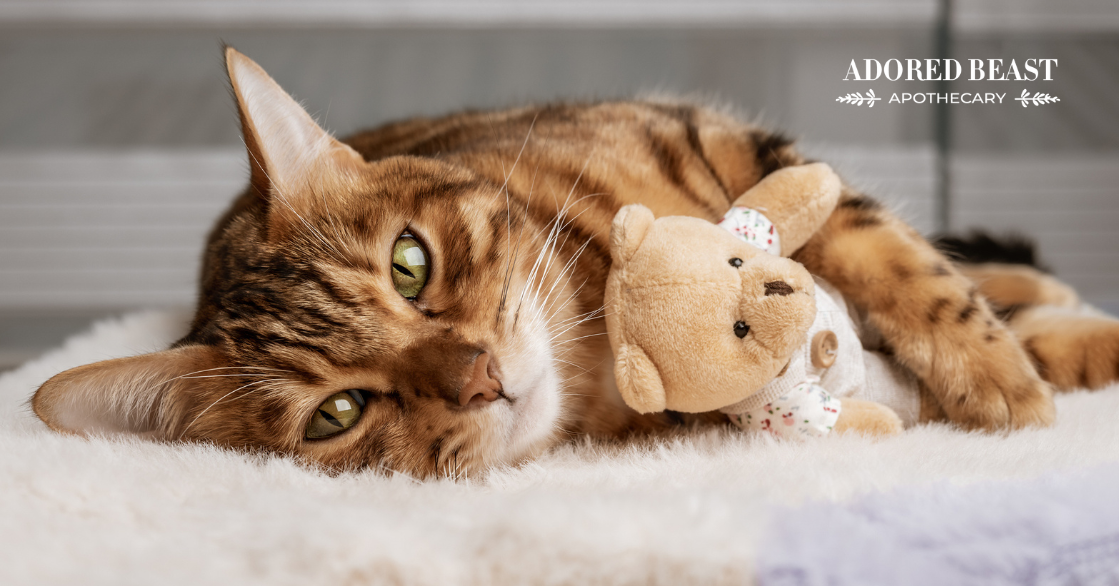If you’re a cat owner, you’ve likely heard of feline calicivirus, a common viral infection that can cause respiratory and oral disease in cats.
Or maybe you haven’t! And that’s ok – it probably means you’ve never encountered it before, and that’s good.
But whether you’ve heard of it or not, it’s always good to be equipped with the knowledge!
So, this week we’ll talk about what feline calicivirus is, what causes it, the symptoms to watch for, and how you can help your adored beast recover.
What is Feline Calicivirus (FCV)?
Feline calicivirus (FCV) is a highly contagious virus that belongs to the family Caliciviridae. It is one of the primary pathogens responsible for respiratory disease in cats and is FCV causes more than 50% of cat respiratory infections.
It is especially prevalent in environments with multiple cats, such as shelters, catteries, or multi-cat households.
The virus can survive in the environment for several weeks and can be transmitted through direct contact with infected cats, contaminated objects, or aerosolized respiratory secretions.
Causes and Symptoms
FCV infects cats through direct contact with infected cats or contaminated environments. Cats who are carriers of the virus can shed it intermittently, even if they show no signs of illness. The virus primarily targets the respiratory tract and oral cavity, causing a range of symptoms varying from mild to severe.
The symptoms of feline calicivirus can vary widely depending on the strain of the virus and the overall health of your cat. Some cats may exhibit mild symptoms and recover quickly, while others can develop more severe disease. Common symptoms of feline calicivirus include:
- Upper Respiratory Signs:
- Sneezing
- Nasal discharge
- Congestion
- Coughing
- Oral Signs:
- Reluctance to eat (due to pain or because they’re having trouble breathing or smelling)
- Ulcers or sores on the tongue, gums, or palate
- Excessive drooling
- General Signs:
- Fever
- Lethargy
- Conjunctivitis (inflammation of the eyes)
- Sores around the eyes
- Excessive tearing
- Lameness or joint pain
Ok, so how can you help your furry feline?
How to Help Your Kitty
If you suspect that your cat is showing signs of FCV, you may want to speak to your vet about the symptoms. Sometimes the respiratory symptoms can mirror other issues. Diagnosis is typically based on clinical signs, although additional tests such as PCR (polymerase chain reaction) may be used for confirmation.
If you do make an appointment, be sure to let your vet know your suspicions before going it. Because it’s highly contagious, you want to allow the clinic to take precautions to prevent it spreading to other patients.
Thankfully, most cats will recover fully from FCV following at-home supportive care.
Here’s what you can do to help:
- A warm, comfortable environment. Just as you’d want to curl up in bed with a cold, make sure your kitty has a nice cozy spot to escape to. Give them lots of cozy blankets that they can snuggle into and get some good rest. Make sure there’s good air flow.
- Humidifier. Keeping the air moist can help to ease some symptoms. This is important – you want them to be warm, but not warm and dry!!
- Good nutrition. You want to support the whole body with species-appropriate food with lots of moisture. Consider what you’d like to have when you’re sick with a chest cold. I bet you’re thinking chicken soup! Bone broth is a great option for the high-value nutrition and added moisture – mix it in with their canned or raw food. You want soft food that goes down smoothly (i.e. no kibble).
- No irritants. You want to be sure you’re clearing the air or anything that can further irritate the respiratory tract. This means avoiding things like scented candles, chemical cleaners, room-sprays, etc. – really anything that your cat may breathe in that could cause them further irritation. Change your furnace filters and consider getting an air purifier.
- Elevate their food plate. For these kitties, you absolutely want to be feeding from a flat plate, and elevating the plate it can really be beneficial.
- Reduce/eliminate stress.
- Know their personality. Does your kitty like to be close to you or prefer some alone time and a place to escape to if they want to? Do they like soothing music or the tv on? Do they like their other pet friends around them? Give them the things they really like.
- Supportive supplements. There are several different supplements that you can turn to for a little extra TLC:
- Antioxidants – For that added immune boost! Turkey Tail Mushrooms and Phyto Synergy are our top choices.
- Probiotics -Protect the immune system by supporting the gut (where most of the immune system lives). Rotate different choices to keep keep the immune system strong. Our Felix’s Flora is a really good choice, but if you’re looking for supplements, giving both Felix’s Flora and Feline Gut Soothe can be really helpful – or, at the very least, rotate them.
- Echinacea – acts upon the immune system by helping decrease inflammation, move lymph, cool fluids, and increase white blood cell counts. Echinacea increases macrophage production as well as T-cell production.
- Slippery Elm – slippery elm helps lubricate the mucus membrane lining along the respiratory tract, making it helpful for inflammation. Feline Gut Soothe has slippery elm.
- Marshmallow Root – The mucilage in marshmallow root coats and soothes the respiratory tract and helps thin out and loosen built up mucus, which helps to expel it from the respiratory tract. Plus, its analgesic properties can help with pain relief. Feline Gut Soothe also has marshmallow root.
- Homeopathy – Look for homeopathic eyedrops for animals that contain euphrasia. Ask your homeopathic veterinarian for the calicivirus nosode. Echinacea 12C is also a good go-to for feline calicivirus.
When our kitties are uncomfortable, we’re uncomfortable! With most cases of feline calicivirus, thankfully, it’s relatively easy to help relieve that discomfort naturally, with a little at-home support. Put yourself in their shoes, and think about what you want when you’ve got a cold, and try and replicate it for them. Plus, don’t forget a lot of extra love!












